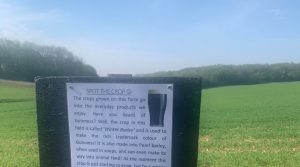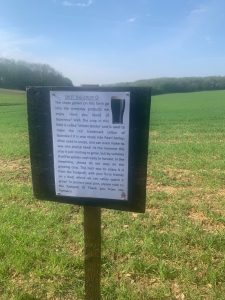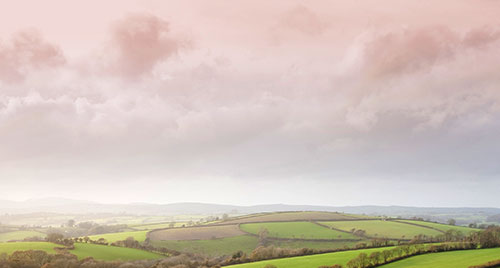Spot the Crop and Lockdown Learning
Thursday 28th May 2020 in Uncategorised


Over the last few months life has changed for all of us, the Covid-19 lockdown restrictions have presented challenges for everyone, not least the farming community.
In early March, shoppers across the country were faced with the reality of a significantly disrupted food supply chain; panic buying and largely empty supermarket shelves. On 23rd March the UK went into lockdown, only allowed out to shop for essentials or once a day for exercise.
Suddenly, Britain developed a passion for walking. For farmers everywhere this presented something of a challenge with many people either ignorant to the location of footpaths or simply not understanding the damage done by walking directly across a field growing crops or through a field of livestock with a loose dog.
Hannah, a farmer’s daughter from Hertfordshire, saw this ‘new normal’ as an opportunity. Hannah wanted to provide walkers with an understanding of what was going on in the fields of ‘grass’ that they were walking through and, by helping people make the connection between what they see in the fields and what is on the supermarket shelves, promote a shared sense of responsibility for the countryside. It was with this in mind that her ‘Spot the Crop’ signs were created.
The family farm is about 500 acres of arable land and pasture in Hertfordshire and this year have wheat, barley and oats in the ground. Hannah’s signs went up and were seen by walkers around the area, including my parents and several of mine and Hannah’s former teachers. The signs were met with amazing positivity and walkers started to share pictures of Hannah’s signs on social media, with RAC tweeting (@Reading_Ag) a picture of the signs in April.
On Friday, I caught up with Hannah on a Zoom video call (of course…) where we spent a very enjoyable hour discussing some of the challenges and opportunities presented to the farming industry as a result of Covid-19. A keen next-generation farmer who has recently finished a French and Spanish degree at Durham University, Hannah is passionate about British agriculture and sharing her love of the farm with public. We were very much in agreement that whilst lockdown has certainly presented its difficulties, it has also provided a unique chance for the farming community to help the wider public make the ‘farm to fork’ connection.
It seems fairly clear at the moment that whilst a lot of people are developing a better awareness of where their food comes from, many still aren’t. Whilst some may know that crops in the fields are used for food in some capacity they wouldn’t, for instance, be able to give an example of what barley could be used for let alone that it is a key ingredient in that all important Friday night pint!
Providing the public with this knowledge is vital, as farmer Matt Redman wrote in Farmers Weekly (2nd May 2020) ‘We need to give people a positive experience on the land we manage whilst everything else is upside down and not so great. As customers we support businesses that give us good service and a positive experience – the people walking the footpaths are our customers and we keep asking for support – maybe we need to earn it a bit more.’
The positive reception that has met Hannah’s signs has shown that people are not only willing to learn, but also that by providing a connection between what they are seeing in the field and everyday items such as flapjacks, beer or biscuits, then they’re excited to learn and through the medium of social media, share that newly discovered information with their friends and family. This can only be a good thing.
Now more than ever we are reliant on British agriculture to keep the supermarket shelves stocked. In the UK we benefit from a safe and reliable food supply chain, but the Covid-19 crisis has presented farmers and growers across the UK with a chance to shout about what they do best, produce amazing food for our supermarkets.
Looking to the future, Hannah and I both feel very strongly that more of this knowledge should be passed to children through the school curriculum. A basic knowledge of British produce and what is in season could encourage children to make healthier food choices and develop cooking skills; basic elements of crop growth and livestock production could be taught in biology and chemistry lessons; and geography lessons could include topics such as climate change and the effect this has on how farmers grow food around the world. The list really is endless!
The public need to have a knowledge and understanding of where their food comes from, whilst many of us are reliant on farmers to put food on our plates, we are all reliant on the countryside, on the fields and the soil, to help produce that food and we must share the responsibility for looking after and enjoying the countryside appropriately.

